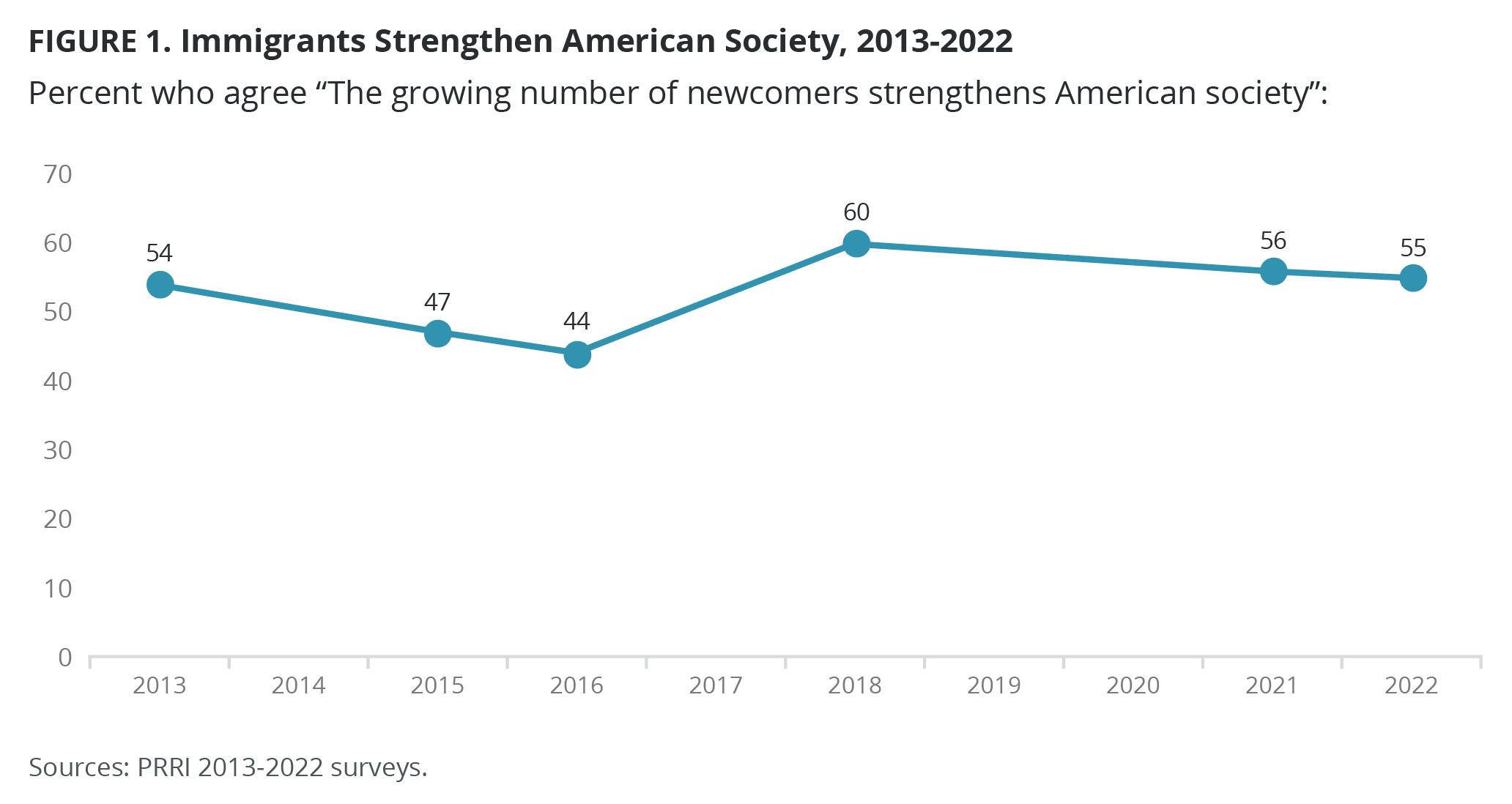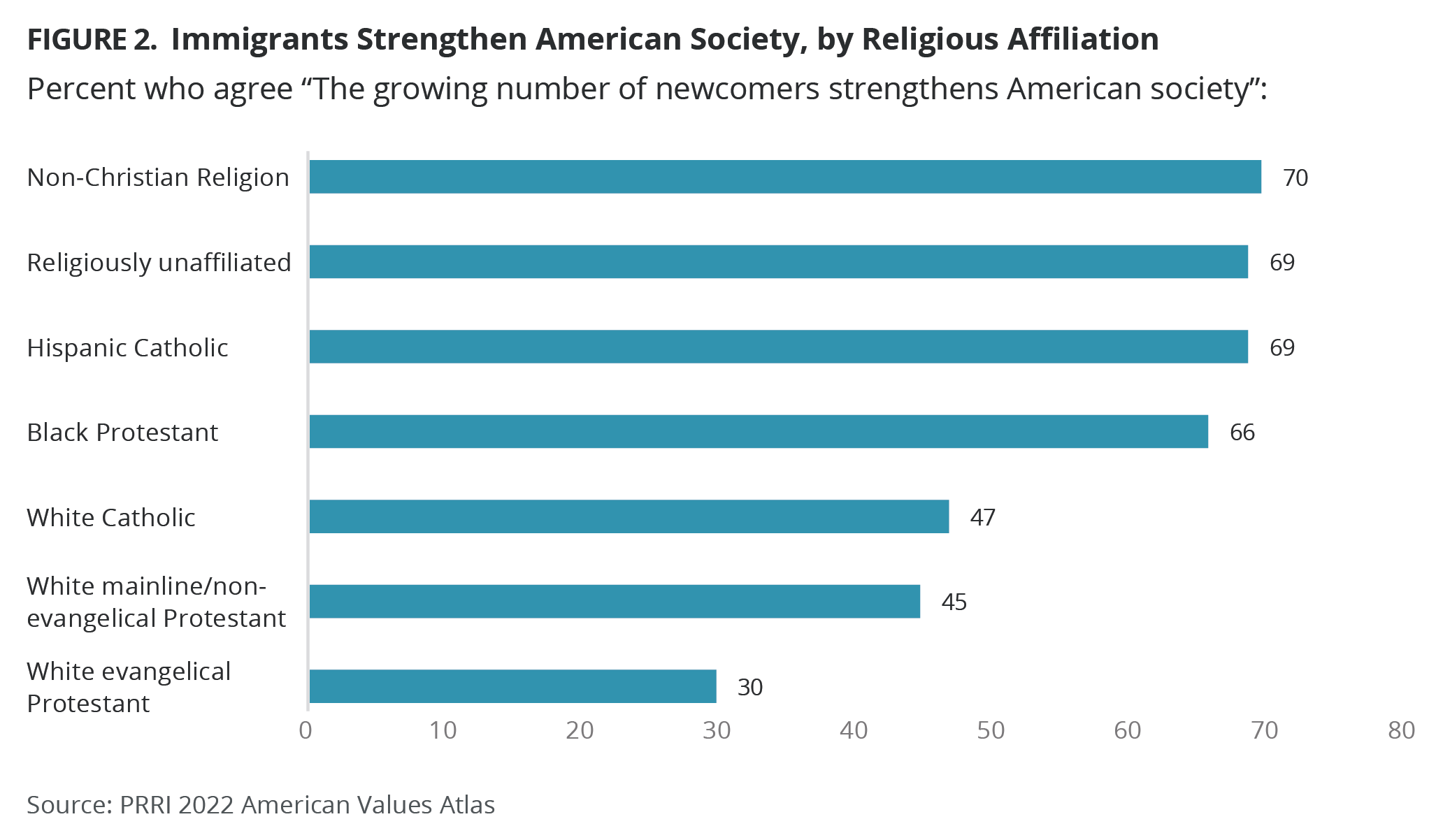In 2013, immigration policy was top of mind for many Americans due to President Obama’s push for immigration reform and the creation of the “Gang of Eight” senators who (unsuccessfully) strove to craft a bipartisan immigration reform bill. Since then, PRRI has collected survey data as the issue has gone in and out of the public eye. Currently, extremely low unemployment has caused business leaders to be more vocal about the need to increase the immigrant labor force. At the same time, more and more families and children are seeking asylum in the United States as they flee from violence and extreme poverty. In this context, it is helpful to understand how Americans’ attitudes about immigration and immigrants have— or have not — changed over time.
On the whole, PRRI survey data from 2013-2022 shows a modest uptick in Americans’ positive attitudes about the impact immigrants have on their communities. Overall, Americans’ attitudes about immigrants’ impact on the larger society are nearly unchanged during that same period, though there is movement in both positive and negative directions among specific religious groups.
Increased Positive Perceptions of Immigrants’ Impact on Local Communities
Americans’ attitudes have grown more positive in recent years regarding immigrants’ impact on crime and the economy in their communities. For example, in 2016 (the first year the question was asked), a PRRI/Brookings immigration survey found that 58% of Americans thought that the statement “immigrants increase crime in local communities” did not describe immigrants well. In 2022, PRRI’s American Values Survey showed that 61% of Americans thought the statement did not describe immigrants well. Meanwhile, on the economy, PRRI surveys asked respondents if they agree or disagree with the statement “immigrants burden local communities by using more than their share of social services.” In 2018, Americans were evenly divided on this question (49% vs. 49%). In 2022, 51% of respondents said this statement did not describe immigrants well and 46% said it did describe immigrants well — a slight uptick in the percent of respondents who did not think immigrants burden communities.
The positive changes in these perceptions were largely driven by changes in the attitudes of Black Protestants, religiously unaffiliated Americans, non-Christian religious groups, and Christians who identify as neither Catholic nor Protestant. Other groups’ attitudes have largely remained the same over the past several years, although white evangelical and mainline Protestants did show some drift toward more negative attitudes about immigrants’ impact on the economy.
Regarding perceptions of crime, in 2016, 65% of Black Protestants disagreed with the statement that “immigrants increase crime in local communities.” In 2022, this percentage was 72%. For religiously unaffiliated Americans in 2016, the percentage that disagreed was 66%. In 2022, it rose to 74%.
Small positive changes can also be seen in Black Protestants’ and non-Christian religious groups’ perceptions of immigrants’ economic impact on communities. In 2018, when asked if immigrants burden local communities by using more than their share of social services, 57% of Black Protestants disagreed. In 2022, this percentage remained about the same at 59%. Of non-Christian religious respondents, in 2022, 66% said the statement “immigrants burden local communities” did not describe immigrants well, an increase from 58% in 2018.
That said, attitudes among white Protestants on this issue have become slightly more negative over time. Among white evangelical Protestants, in 2018, only 36% disagreed with the statement that “immigrants burden local communities by using more than their share of social services.” This percentage dropped to 30% in 2022. For white mainline Protestants, this percentage decreased from 48% in 2018 to 44% in 2022.
Fluctuations on Perceived Contributions or Threats From Immigrants
Americans were also asked if a growing number of newcomers from other countries strengthens American society or threatens traditional American customs and values. In 2013, the PRRI/Brookings Religion, Values, and Immigration Reform survey showed that 54% of Americans agreed that immigrants strengthen American society. In 2015, according to the PRRI American Values Survey, this percentage fell to 47%. It dropped again in the 2016 American Values Survey, which shows this percentage at 44%. Then, in the 2018 American Values Survey, the percentage of Americans who agreed that immigrants strengthen American society rose 16 percentage points to 60%. In the 2022 American Values Survey, however, that percentage was almost exactly the same as it had been in 2013, with 55% of Americans agreeing that immigrants strengthen American society.

Within religious groups, attitudes about immigrants’ impact on American society have grown more negative among white Catholics and Protestants, but more positive among nearly all other groups. In 2013, 36% of white evangelical Protestants said that immigrants strengthen America. In 2022, that percentage went down to 30%. Half of white mainline Protestants (50%) said immigrants strengthen American society in 2013, with a slight decrease to 45% in 2022. And 52% of white Catholics agreed in 2013, compared to 47% in 2022.
On the other hand, 56% of Black Protestants agreed that immigrants strengthen American society in 2013, compared with 66% in 2022 — a difference of nearly 10 percentage points. Among religiously unaffiliated respondents, 64% agreed that immigrants strengthen American society in 2013, whereas 69% agreed with this statement in 2022. Responses from Christians who are not Catholic or Protestant were first specifically tracked in 2015, when 42% agreed. In 2022, 57% of Christians who are not Catholic or Protestant agreed – a difference of 14 percentage points.

It is clear Americans remain generally welcoming toward immigrants. Majorities of PRRI’s survey respondents view immigrants as a source of strength in the United States, as law-abiding, and as contributing to economic life. And attitudes have moved in a slight positive direction over the last ten years. The more difficult question, as ever, is whether attitudes among the American public can translate into policy reform. Americans across the political spectrum agree that immigration reform is needed, but the chances of seeing another “Gang of Eight” anytime soon appear slim.
Laura E. Alexander, Ph.D. is a member of the 2022-2023 cohort of PRRI Public Fellows.




